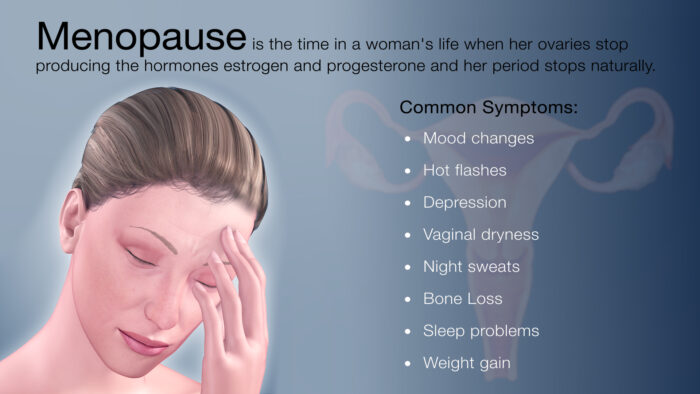
Menopause is a natural and inevitable phase in a woman’s life, typically occurring between the ages of 45 and 55. During this transition, the ovaries gradually decrease their production of estrogen and progesterone, leading to significant hormonal changes in the body. These hormonal fluctuations can result in a wide range of physical and emotional symptoms, affecting women differently.
Common Symptoms of Menopause and Their Impact
Menopause brings forth a variety of symptoms that can have a profound impact on a woman’s daily life and well-being. Hot flashes, characterized by sudden waves of intense heat and sweating, can be disruptive and uncomfortable. Night sweats can disrupt sleep patterns, leading to fatigue and irritability. Mood swings, anxiety, and depression can arise due to hormonal imbalances. Vaginal dryness can cause discomfort during intercourse and affect sexual satisfaction. Additionally, menopause is often associated with changes in metabolism, leading to weight gain and difficulty in maintaining healthy body weight.
Natural Approaches to Relieving Symptoms
Many women prefer natural approaches to manage menopause symptoms and support their overall well-being. These approaches often involve lifestyle adjustments, dietary changes, and the incorporation of specific supplements for moms and herbs. Embracing a holistic approach can provide women with a sense of empowerment and greater control over their health.
Essential Nutrients for Hormone Balance
Ensuring an adequate intake of essential nutrients is crucial for supporting hormone balance during menopause. Calcium, vitamin D, magnesium, and vitamin K are essential for maintaining strong and healthy bones. B vitamins, particularly B6 and B12, play a vital role in supporting mood, energy levels, and cognitive function. These nutrients can be obtained through a balanced diet consisting of leafy greens, dairy or dairy alternatives, fish, nuts, seeds, and fortified foods. In some cases, dietary supplementation may be necessary to meet the specific nutritional needs during menopause.
Herbal Supplements for Symptom Relief
Herbal supplements have gained popularity as a natural approach to managing menopause symptoms. Black cohosh, derived from a North American plant, has been used traditionally to alleviate hot flashes, night sweats, and mood swings. Dong Quai, an herb native to China, has been commonly used to relieve menopause symptoms such as hot flashes, vaginal dryness, and menstrual irregularities.
Red clover, another herb rich in isoflavones, has been found to have estrogen-like effects in the body, helping to alleviate hot flashes and support bone health. Evening primrose oil, derived from the evening primrose plant, contains gamma-linolenic acid (GLA), which can help reduce breast pain and tenderness often associated with hormonal changes.
These herbal supplements can be beneficial for some women, but it’s important to consult with a healthcare provider before starting any new regimen to ensure safety and efficacy.
Omega-3 Fatty Acids: Supporting Hormone Balance and Wellness

Omega-3 fatty acids, particularly eicosapentaenoic acid (EPA) and docosahexaenoic acid (DHA), are essential fats that are known for their anti-inflammatory properties. These fatty acids play a crucial role in supporting hormone balance and overall wellness during menopause. Omega-3s have been found to reduce the frequency and intensity of hot flashes, improve mood and cognitive function, support cardiovascular health, and reduce joint inflammation. Including fatty fish like salmon, mackerel, and sardines in the diet or taking high-quality fish oil supplements can help ensure an adequate intake of omega-3s.
Vitamins and Minerals
Vitamins and minerals are vital for menopause support as they play various roles in hormone regulation and overall health. Vitamin E, a powerful antioxidant, has been shown to alleviate hot flashes and night sweats. Vitamin C supports collagen production, which can help improve skin elasticity and reduce vaginal dryness. Calcium and vitamin D are essential for maintaining bone health and reducing the risk of osteoporosis. Magnesium can help reduce muscle tension and improve sleep quality. Including a variety of fruits, vegetables, whole grains, nuts, and seeds in the diet can provide these essential vitamins and minerals. However, in some cases, dietary supplementation may be necessary to meet specific nutrient needs during menopause.
Probiotics: Gut Health and Hormonal Balance

The gut microbiome plays a significant role in overall health, including hormone balance. Probiotics are beneficial bacteria that support a healthy gut microbiome. They have been shown to help alleviate menopause symptoms, improve mood, support immune function, and enhance nutrient absorption. Fermented foods like yogurt, sauerkraut, kimchi, and kefir are excellent sources of probiotics. Alternatively, high-quality probiotic supplements can be taken to ensure a sufficient intake of beneficial bacteria.
Exercise and Physical Activity
Regular exercise and physical activity are key components of a holistic approach to managing menopause. Exercise can help reduce menopause symptoms, improve mood, enhance bone health, and maintain a healthy weight. Engaging in activities such as walking, jogging, swimming, cycling, or yoga can provide numerous benefits during this transitional phase. Exercise not only supports physical health but also promotes mental well-being, reduces stress, and enhances overall quality of life.
Stress Management Techniques for Hormonal Health

Stress management is crucial for maintaining hormonal health during menopause. High levels of stress can disrupt hormone balance and exacerbate menopause symptoms. Incorporating stress management techniques such as mindfulness meditation, deep breathing exercises, yoga, journaling, or engaging in hobbies can help reduce stress levels and promote hormonal balance. Taking time for self-care, practicing relaxation techniques, and seeking support from loved ones or support groups can contribute to a smoother menopause experience.
Lifestyle Adjustments for Hormone Balance and Wellness
Making lifestyle adjustments can significantly impact hormone balance and overall well-being during menopause. Getting enough sleep is crucial for hormone regulation and overall health. Establishing a consistent sleep routine, creating a relaxing sleep environment, and practicing good sleep hygiene can help improve sleep quality. A balanced diet that includes whole foods, plenty of fruits and vegetables, lean proteins, and healthy fats supports overall health and hormone balance.
Reducing alcohol and caffeine consumption can help alleviate menopause symptoms such as hot flashes and improve sleep quality. Quitting smoking is beneficial for overall health and can help reduce the risk of various health issues associated with menopause.
Conclusion
Menopause is a significant phase in a woman’s life, and the journey can be made smoother by adopting a natural approach to hormone balance and overall wellness. It is important to remember that every woman’s experience is unique, and consulting with a healthcare provider is essential to ensure a personalized approach. Embracing menopause as a natural phase of life and taking proactive steps toward hormone balance and wellness can lead to a healthier and more fulfilling journey.










